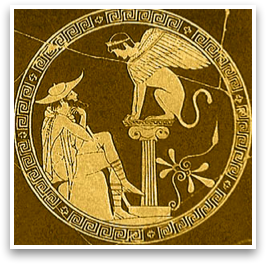
Oedipus the King
The Greek philosopher (and some would say father of literary theory) Aristotle argued that Oedipus the King was the model Greek tragedy. This assessment has been confirmed by literary critics for over 2,000 years. Although a devoted husband, king, and father, Oedipus is nevertheless a victim of fate, seemingly unworthy of the fate that befalls him. In the end, this tragic tale of a family and a kingdom has influenced everyone from Shakespeare to Freud.

Themes and Facts
- Part of the Oedipus Cycle of plays by Sophocles. The other plays are Oedipus at Colonus and Antigone.
- Birth of Sophocles was between 497-494 B.C.
- He won numerous dramatic competitions, including one at the age of 30 defeating Aeschylus.
- His play Antigone earned him a general’s position.
- He wrote some 120 dramas, of which only about 7 tragedies survive.
- He wrote at a time when Democracy was beginning to flourish in Greece, and its relationship between the individual and state were being debated.
- Note the temporal elements within the play. The action occurs within a single day.
- Sophocles’ sphere of influence is vast, from poets to philosophers to psychologists.
- The tragedy of the play arises with the conflict between the city and the state.
- Note the importance of the “appearance vs. reality” theme
- As you would expect, images of sight and blindness are prominent throughout
- Fate vs. free will should be considered as well.
Study Questions
- Is Oedipus a figure worthy of the reader's pity, or does he somehow deserve his fate?
- What is Oedipus's "fatal flaw"? Is it something he chooses, or is it beyond his control?
In Oedipus the King, we encounter a tragedy that, arguably, is the best of its kind. Ultimately, the tragedy of Oedipus's fall may very well be nothing but the whim of fate and coincidence. In short, sometimes people suffer through no marked error of their own. In the end, his fatal flaw may very well be nothing more than ignorance, only underscoring the play's pathos.
Helpful Links
- Oedipus the King Study Questions (West Chester University)
- Aristotle's Theory of Tragedy (Barbara F. McManus)
- Oedipus the King Study Questions (A. J. Drake)
- Oedipus the King Study Questions (Kip Wheeler)
- Oedipus the King Study Guide (CUNY)
- Notes and Questions for Oedipus the King (Grand Valley State University)